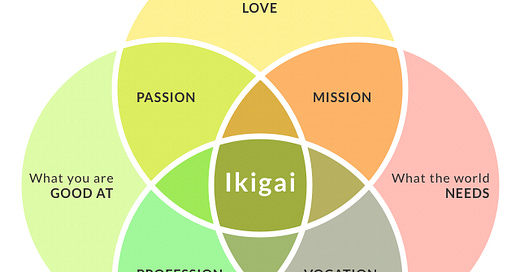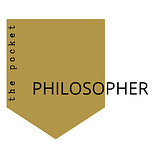Thought
Ichi-go ichi-e teaches us to focus on the present and enjoy each moment that life brings us. This is why it is so important to find and pursue our ikigai.
—Hector Garcia and Francesc Miralles in their book Ikigai
Every morning I write an email exploring life through the eyes of the world’s greatest thinkers. Sign up here if you would like to receive it directly in your inbox.
Application
Before we dive too deep into this concept, let’s begin with a graphic to help make sense of ikigai and what it has to do with happiness.
This is a very helpful—albeit oversimplified—rendition of ikigai.
Ikigai is a concept that originated on the Island of Okinawa. Okinawa harbors one of the highest concentrations of centenarians (people who live over the age of 100) in the world.
Of the hundreds of studies done about Okinawa (including Dan Buettner’s famous Blue Zones) the consistently re-emerging phenomenon that speaks to their collective longevity is this concept of ikigai.
The Okinawans not only live long lives, but extraordinarily happy ones as well. Ikigai trains folks from an early age to find their purpose and lean into it as passionately as they can.
Ikigai is the intersection of what we are passionate about, what we’re good at, what the world needs, and what we can get paid to do.
A very simple but potentially transformative application from this letter is to simply meditate, ponder, and challenge the notion—have I found my ikigai?
So often in industrialized nations, we’re content to simply analyze our title and income as it relates to our work satisfaction and I believe this does us a big disservice. (I don’t think it’s coincidental that “right livelihood” is a part of the famous Buddhist Eightfold Path.)
Such a quest, however, can often feel daunting and overwhelming so here’s two ideas to help get the creative and imaginative juices flowing.
1) Ask a friend, spouse, or close family member.
Often the people close to us can see these things even better than we can. Show them the ikigai graph and ask them what they think fits in the middle of the circle.
2) Consider what brings you flow.
Flow is the state in which you find yourself when you are completely absorbed and satisfied in a task. It’s the behavior a toddler demonstrates when they are totally lost in building, learning, or fixing something and they don’t even hear you when you call their name.
If you or your loved ones aren’t sure what brings your flow, experiment!
Trying new activities will teach you so much about yourself, and getting lost in states of bliss can help lead you into your ikigai and identify your deepest purpose and intentions in life.
Often this purpose is not so much a specific outcome, particular product to be made, or money to be earned. Rather, it is the person you become and the relational legacy you create when you are a person who has found their deepest joy made complete.
Do you know someone who would find this interesting? Share it here!
Backstory
Before I go any further, I cannot recommend the book Ikigai by Garcia and Mirrales that I referenced above. Neither of them is from Okinawa but they are longtime students of the habits and happiness of the Okinawan people.
At its core, Ikigai is about finding joy. It’s about peeling back the potentially distracting or pointless elements of life, and finding your deepest happiness. Think how dreadful and harmful all of those stressful and mundane tasks are having on our health and longevity.
It’s easy to get lost in the idea that happiness is discovered in finding your one true purpose—like if we find our true calling we’ll finally be happy. There is a lot of disappointment waiting for us in that line of thinking.
Rather, happiness through the lens of Ikigai is about finding things that we love so much, we can do them endlessly and they’ll give us more energy. When we find a way to support ourselves off of this work, we’re able to fill our day with tasks we enjoy and which have personal meaning. More than anything else, this sense of purpose leads to an alignment of life that effects all other aspects.
What I mean is, when you have something you care about so deeply and find so much joy in, one is motivated to eat healthy, exercise, stay active, get rest, and do all of the other things that make them healthier and live longer. Furthermore, there is also an element at play that people who live within ikigai are “holding” on to life, not yet ready to move on which seems to increase their lifespan as well.
To this point, beyond Ikigai, Okinawans are also known for their tight and intentional communities, healthy plant-based diet, and intentional slow lifestyle.
They have a proverb,
Walk slowly, and you’ll go far.
This lifestyle is jarring when compared to the modern race of career and capital.
But Okinawa is living proof that slow, intentional living filled with hours of flow is the key to long and happy life.
Ikigai is the key that can unlock this door.
This reflection feels trite because it is so simple, and yet choosing this path in our time and space is overwhelmingly difficult and complex. However, the age of the internet has also made such a lifestyle more possible than ever. When we find our flow, we can joyously share it with the world instantaneously, and who knows what will happen then!
Until tomorrow, enjoy a day of deep reflection, rich conversation, and hours of flow!
-TPP
PS, Check out our IG page for daily simplified reflections from the newsletter!
Image: https://www.forbes.com/sites/chrismyers/2018/02/23/how-to-find-your-ikigai-and-transform-your-outlook-on-life-and-business/?sh=371d269d2ed4















Share this post